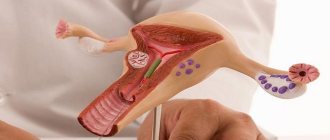Why can a doctor prescribe Nifedipine to an expectant mother for uterine tone and other indications?
Nifedipine is a drug that primarily fights high blood pressure. However, due to its ability to dilate blood vessels and relax muscles, it is actively used to relieve increased uterine tone when there is a threat of miscarriage.
Nifedipine can be prescribed to expectant mothers if the following problems are detected:
Hypertension (high blood pressure)
It is important to note that in pregnant women it is divided into two types. The first is chronic, or one that arose even before pregnancy.
The second is acquired, or gestational hypertension, which appears during pregnancy. Hypertensive crisis is a sharp increase in blood pressure. Heart diseases - angina pectoris, heart attack and others. Increased tone, or hypertonicity, of the uterus.
These problems can cause serious complications and premature birth.
Can I take it if I have hypertension?
Treatment of increased uterine tone with Nifedipine during pregnancy is considered appropriate if muscle spasms in the uterus are a consequence of high blood pressure.
Since pregnancy is a relative contraindication to taking the drug, it is prescribed to women in the second and third trimester, when the effect of the drug on the embryo is minimal.
In the event that a violation of uterine tone is observed in the expectant mother in the first trimester, gynecologists replace Nifedipine with analogues (Papaverine, Duphaston, Cordafen). This phenomenon is due to the fact that taking the drug in early pregnancy provokes the manifestation of dangerous anomalies, which not only contribute to disruption of intrauterine development, but can also provoke premature birth.
Instructions for using tablets without consequences
The drug is taken strictly as prescribed by the doctor, in an individually calculated dosage and according to the prescribed course. Nifedipine can be purchased at the pharmacy only with a prescription.
The medicine is available in the form of tablets and solution for injection. Pregnant women are prescribed only the tablet drug, since it has a more gentle effect. However, tablets with nifedipine are different: it has many complete analogues, that is, the pharmacist at the pharmacy may suggest that you replace Nifedipine, for example, with Cordafen or Corinfar, while the possibility and feasibility of this replacement should be assessed by the doctor, and not the pregnant woman herself.
It is also very important to know that tablets with nifedipine come in rapid or prolonged action - retard tablets; they differ in the rate of absorption into the blood, the time of action, and also, if possible, cause unpleasant consequences in the form of side effects. The doctor prescribes a specific form; replacing regular tablets with retard on your own is unacceptable
The dosage and duration of treatment are indicated only by the attending physician, depending on the severity of the disease and the severity of symptoms. The average course of treatment is 1.5 months. But Nifedipine is also prescribed one-time, as an “ambulance” for uterine hypertonicity and angina attacks.
Medical guidelines indicate that the maximum daily dose of nifedipine for general patients is 120 mg. For pregnant women, this indicator is determined by the doctor, he can reduce it.
The tablets prescribed in the course are taken after meals with plenty of water. During an attack of angina or to lower blood pressure, the tablet is placed under the tongue so that the active substance enters the bloodstream faster. After taking the medicine, it is recommended to lie quietly for about 30–40 minutes.
If there is a threat of miscarriage, other medications may be prescribed in addition to Nifedipine.
If necessary, the doctor can replace Nifedipine with other drugs that contain the same active substance, or with other drugs that can relieve high blood pressure and hypertonicity of the uterus. Changing medications on your own is unacceptable.
Pregnancy is a wonderful time of waiting for your baby. The main task of the expectant mother at this time is to give birth to her baby strong and healthy, to carry her to term, protecting her from harmful influences.
Unfortunately, despite all the precautions, sometimes there are cases of mandatory use of medications. Such drugs include Nifedipine, a medical drug that is widely used in international medicine.
Nifedipine belongs to antihypertensive drugs, that is, drugs aimed at lowering blood pressure.
The main indications for its use are:
- cardiac ischemia,
- angina symptoms,
- hypertension of various types,
- increased uterine tone in expectant mothers.
The medicine is also used for blockage of blood vessels and blood stagnation.
Coronary heart disease is a disease characterized by impaired blood supply due to damage to the heart's coronary arteries.
Angina pectoris is a clinical form of ischemic disease in which the supply of blood to the myocardium is catastrophically low.
Hypertension is a disease whose main characteristic is increased blood pressure. Hypertension can be arterial, venous, pulmonary, intra-abdominal, intracranial, portal, biliary and other systems. Arterial and renal hypertension are extremely dangerous not only for a pregnant woman, but also for her unborn baby. Nifedipine will help stabilize high blood pressure in the expectant mother better than other medications and normalize her condition.
Contraindications and side effects
It is contraindicated to take Nifedipine tablets on your own, even if severe uterine tone occurs. Doctors do not prescribe medicine for the following conditions in women:
- reduced blood pressure;
- intolerance to any of the constituent components of the drug (including minor ones);
- unstable angina;
- chronic ischemic heart disease in the acute stage;
- myocardial infarction that occurred less than a week ago;
- cardiogenic shock;
- collapse;
- aortic stenosis;
- heart failure, decompensated.
If a woman has diabetes mellitus or impaired function of the filtering organs (liver and kidneys), the drug is prescribed in a minimum dose under the supervision of a doctor.
Tablets can cause the following adverse reactions:
- allergic manifestations;
- weakness and drowsiness;
- dizziness and headaches;
- sleep disturbance;
- increased heart rate;
- arrhythmia;
- decreased blood pressure;
- nausea and vomiting;
- swelling of the lower extremities.
Nifedipine analogs and derivatives during pregnancy
And to conclude the article, here is a list of popular medications that contain Nifedipine:
- Adalat (OSMO-Adalat, Adalat SS, Adalat SL),
- Vero-Nifedipine,
- Depin-E,
- Calcigard retard,
- Karin-Fer,
- Kordafen,
- Kordaflex (Kordaflex RD),
- Cordipin (Cordipin retard. Cordipin XL),
- Corinfar (Corinfar UNO, Corinfar retard),
- Nicardia (Nicardia CD retard),
- Nifadil,
- Nifangin,
- Nifebene,
- Nifehexal retard,
- Nifedicap,
- Nifedicor,
- Nifedipine-MIC,
- Nifedipin-Farkos,
- Nifedipur,
- Nifecard (Nifecard XL),
- Nifelate (Nifelat Q. Niphelate P)
- Nifesan,
- Procardia,
- Sanfidipin,
- Sponif 10,
- Tenordrat,
- Phenigidine,
- Farmadipin.
Especially for nashidetki.net - Elena SEMENOVA
Clever girls like these from the Internet, who do not have any close medical education, not to mention a diploma in obstetrician-nynecologist, blow the minds of normal doctors who, fulfilling their duty, diagnose the problems of a pregnant woman and prescribe appropriate treatment, with stories “but I read on the Internet” , “but my friend’s,” “but my mother told me,” etc. Then the doctors forget about any addiction to the matter and prescribe at least something to save the pregnancy. At the same time, the majority of pregnant women see no reason not to drink a glass of wine, others smoke throughout pregnancy, and still others dine at McDonald's
Heart colitis can be dangerous
Have you been struggling with HYPERTENSION for many years without success?
Head of the Institute: “You will be amazed at how easy it is to cure hypertension by taking it every day...
Fortunately, the complaint of a stabbing heart is heard much more often than complaints of pressing or burning pain. The thing is that stabbing pain is not at all characteristic of the heart and its origin is almost always vertebrogenic, that is, associated with pathology of the musculoskeletal system and trauma to small nerve endings.
Remember - the heart never hurts.
Much more dangerous is the pain that has a pressing or pulling nature, although there may be options here too.
In order to figure out what is causing your colitis, your heart or something else, you just need to follow a few simple steps.
Firstly, you need to pay attention to whether the pain is associated with physical activity, whether it intensifies with fast walking, climbing to the floor, etc. Secondly, when your heart hurts, feel those places on the surface of the chest where there are unpleasant sensations are maximum
If you can find painful points or areas, then consider that the issue is resolved and the problem is not in the heart
Secondly, when your heart hurts, feel those places on the surface of the chest where the discomfort is maximum. If you can find painful points or areas, then consider that the issue is resolved and the problem is not in the heart.
The same applies to those cases when the stabbing pain intensifies when turning the body or when taking a certain body position, posture, or vice versa, the “heart” stops stabbing and all sensations go away after taking a certain body position. If colitis occurs when inhaling, this also indicates that this type of pain is not associated with the heart.
What to do and who to turn to if the pain, although not cardiac and does not pose a threat to health, still disrupts your usual way of life? Or do painful sensations prevent you from doing those things that you are used to doing? Or, perhaps, the very fact of stabbing pain in your heart does not give you peace? I recommend that you contact a neurologist who will interview you and examine you properly, and then, if he has any doubts about your “stabbing heart,” he will refer you to a cardiologist.
In conclusion, I would like to say that this article was written not for patients to engage in self-diagnosis or self-medication, but to save time. If you know everything about your pain thoroughly, you will be able, firstly, to understand which specialist to contact, and secondly, to quickly and accurately answer the doctor’s questions, which will contribute to a more accurate and rapid diagnosis.
About contraindications
In the instructions supplied with the drug, pregnancy is one of the main contraindications. However, Nifedipine is used in gynecology when there is a real threat to the life of a developing child and the expectant mother. Other contraindications worth noting:
- Unstable angina.
- Minimum circulating blood volume or hypovolemia is critical.
- Aortic stenosis.
- History of heart attack.
- Abnormally low blood pressure.
- Breastfeeding period.
- Individual intolerance to any of the components of the drug.
- Treatment based on Rifampicin.
Indications and contraindications
The main indication for taking this drug is spasm. In the case of pregnant women, this is uterine spasm, which can have a negative effect on the baby. Nifedipine is not a harmless drug, therefore it has a number of contraindications.
- Low pressure;
- Allergy to the composition of the drug;
- Angina pectoris during exacerbation;
- Heart attack;
- Valve collapse;
- Aortic stenosis;
- Chronic heart failure.
All of the above diseases are absolute contraindications for taking Nifedipine for hypertonicity. However, there are still conditions in the body in which this drug should be taken with extreme caution.
- Failure of the liver and kidneys;
- Diabetes of any form.
Potential harm of Nifedipine during pregnancy
Undoubtedly, over the several decades during which Nifedipine has been used to treat cardiovascular diseases, various studies have been conducted on this substance. Cardiologists claim that its effectiveness and safety have been proven at the global level, which is why the medicine is popular in many countries.
But the safety of Nifedipine during pregnancy remains scientifically unproven to this day: no official studies have been conducted on this issue. But in the course of various experiments, the teratogenic, embryotoxic and fetotoxic properties of Nifedipine were revealed. That is, it cannot be considered a priori safe for the fetus, especially in the first and second trimesters. Regarding the third trimester of pregnancy, that is, information about the safety of the drug for the unborn child.
Non-pregnant patients prescribed Nifedipine should not relax either: surveys conducted by the American National Heart Institute found that taking the tablets orally increases the risk of mortality among patients. Researchers at the Institute examined more than 8 thousand patients with cardiovascular pathologies and came to the unequivocal conclusion that the use of Nifedipine in a dosage of 30-50 mg is highly likely to lead to the development of stroke, heart attack and even death...
How to take Nifedipine during pregnancy
Here it is simply impossible not to say that the instructions for the drugs recommend just such a potentially dangerous dosage: 10 mg 3-4 times a day, and if necessary, twice or even three times more. The maximum daily dosage when taken orally is 120 mg.
But this does not mean that Nifedipine should under no circumstances be taken during pregnancy. If the doctor sees the need for this, then perhaps you should listen to his professional opinion. It should also be noted that only nifedipine drugs, which have a quick, instant effect, can pose a mortal threat. In modern practice, in particular in gynecology and obstetrics, as a rule, “safer” options are used - prolonged action: they reduce high blood pressure and tone gradually (within 12-24 hours), and thanks to this the therapeutic effect lasts longer. Long-acting nifedipines combine well with other modern medications for hypertension. For greater effectiveness, combined treatment is provided.
Scheme for using Nifedipine for uterine tone
If uterine tone occurs during pregnancy, you should not take Nifedipine on your own. It is not recommended to follow the advice of friends and acquaintances for whom this remedy helped cope with hypertension. It must be remembered that each woman’s body is individual and has its own reaction to the use of medications. For this reason, the Nifedipine regimen for uterine tone is selected individually.
When prescribing the drug, the doctor takes into account:
- gestational age;
- is there active labor?
- how often does the stomach become cramped and how long does the uterine tension persist;
- what are your blood pressure readings?
If you refer to the instructions for use, you can find out that the maximum daily dose of the drug is 120 mg. This amount is contained in 12 tablets. However, for pregnant women, even with strong tone, such a volume is usually not prescribed. Since the instructions for use do not provide for the use of the medication for patients during pregnancy, it is impossible to name the average dosage. According to reviews from women, the medication is prescribed 1-2 tablets 3-4 times a day. The duration of therapy is also determined individually. Nifedipine is usually prescribed for a period of up to one and a half months. At the same time, the drug can be prescribed as an emergency aid for a single use to eliminate severe uterine tone.
It is necessary to take the medicine strictly at certain hours. This ensures the regular supply of the active component to the body and maintains its functioning in the desired mode. The medication is taken before meals with plenty of water. The capsule should not be crushed, chewed or divided beforehand.
Nifedipine prescription and use during pregnancy
What is the medical drug Nifedipine? Can it be used during pregnancy? Many women who are in an “interesting situation” and regularly face heart problems are looking for an answer to this question. This medication with a vasodilating effect is used in cardiology for chronic and acute diseases of the cardiovascular system.
It is extremely undesirable to take Nifedipine during pregnancy, since numerous clinical studies have proven a negative effect on the formation and development of the fetus. In practice, doctors have more than once prescribed this medication, being convinced that the benefit to the mother is more significant than the risk to the vital activity of the embryo.
However, according to the instructions for use, Nifedipine is contraindicated during pregnancy, so it is important to completely exclude superficial self-medication
Doctors prescribe this medication in very extreme cases. For women in an “interesting position” it is appropriate for the following violations:
- attacks of arterial hypertension;
- hypertensive crisis;
- hypertonicity of the uterus.
It is worth adding separately that problems with blood pressure can prevail both before conception and worsen after the 20th obstetric week. This condition is called “Acquired hypertension”, it is dangerous for mother and child. If the female body has already become accustomed to the old diagnosis, then the disease that progresses during pregnancy causes a decline in performance, and in some cases requires hospitalization.
The instructions for use indicate that Nifedipine during pregnancy is strictly prohibited for up to 16 obstetric weeks. Use as directed in the early stages causes a mutagenic effect on the fetus, extensive lesions, and congenital diseases of the infant. In the second and third trimesters, this risk is minimal. It is quite possible to prevent pathological childbirth with this medication.
More often, Nifedipine during pregnancy is prescribed for uterine tone, which can become the main reason for the birth of a newborn at 24–34 obstetric weeks. Despite the high effectiveness and medicinal properties of the drug, the drug is not approved for use by all expectant mothers. The following anomalies of the pregnant body fall into the “taboo” category:
- hypersensitivity to components;
- exacerbation of arterial hypertension (relapse stage);
- chronic heart failure.
It is important to remember that Nifedipine tablets cause side effects during pregnancy. Among them are a sharp decline in blood pressure with hyperemia of the face and skin; attack of nausea, migraine and dizziness; indigestion and bronchospasm; swelling of the limbs and allergic reactions in the form of skin rash, urticaria
In such situations, it is necessary to temporarily suspend further treatment, consult a doctor for advice, carefully study reviews of Nifedipine during pregnancy and, possibly, change the prescribed intensive care regimen.
Maria, 36 years old:
“I took these pills at 30 weeks for hypertonicity. The condition returned to normal after 6 days, but all this time I walked around like a sleepy fly and had a very bad headache. But there was a result, and the child was born healthy.”
Elena, 31 years old:
“Whoever drank Nifedipine during pregnancy will understand me. At week 30, my blood pressure suddenly started to go crazy, I went to the doctor and was prescribed this medication. My blood pressure returned to normal, but I suffered many side effects during treatment: not only did I constantly feel sick, but it also seemed like I was about to faint.”
Sveta, 34 years old:
“And I read the contraindications and side effects and immediately refused such a prescription, although the doctor strongly recommended it, and my friends also advised it. The drug may be worthwhile, but you shouldn’t take it during pregnancy.”
Despite the high effectiveness of this vasodilator drug, its use in an “interesting situation” must necessarily be agreed upon with a gynecologist, otherwise complications in the newborn body will be fatal. Needless to say, such drugs cannot be taken without permission, and if Nifedipine was prescribed, then the dosage indicated by the doctor should be strictly adhered to.
Based on materials from vpolozhenii.com
What can replace Nifedipine?
Nifedipine has many similar drugs with the same active substance: Phenigidine, Cordaflex, Cordipin, Adalat, Corinfar and others. All these medications, according to the instructions, are contraindicated in early gestation and their use is possible when the benefit to the mother is higher than the potential risk to the child.
Photo gallery of medications based on nifedipine
Structural analogues, like Nifedipine itself, have standard and extended-acting forms, so this must be taken into account when choosing a drug. Thus, for emergency treatment, doctors usually use medications with a regular dosage, and for long courses, they may opt for long-acting tablets.
In addition to Nifedipine, many other medications with the same functionality are used in gynecology, but their composition will differ.
Table: antihypertensive drugs for the treatment of pregnant women
| Name of the medication | Active substance | In what form is it produced? | What is it used for during gestation? | Contraindications | Possibility of use during gestation |
| Papaverine | Papaverine hydrochloride |
| Hypertonicity of the uterus |
| The effect of the drug during gestation has not been studied. It is mainly used in parallel with the hormone progesterone or in combination with other drugs. |
| Ginipral | Hexoprenaline |
| Risk of premature birth |
| Ginipral is prohibited in the 1st trimester of gestation and during breastfeeding. In the 2nd and 3rd trimesters of gestation, it is used according to indications. |
| Dopegit | Methyldopa | Pills | Arterial hypertension of moderate and mild severity |
| Recommended use from 20 weeks of gestation. |
| Motherwort | Motherwort herb extract |
|
|
| According to the instructions, the drug is contraindicated during pregnancy or breastfeeding. Doctors do not recommend using alcohol tincture and tablets, but expectant mothers can drink motherwort tea after consulting with a doctor. |
| Chime | Dipyridamole |
|
|
| It is acceptable to use during gestation and breastfeeding as prescribed by a doctor and under the constant supervision of a specialist. |
In the event of a pathological pregnancy, only a doctor can choose the right treatment tactics and medications. If for some reason the medicine is not suitable for the expectant mother, then the replacement is carried out by a specialist. Choosing a medication on your own can cause serious complications with the health of mother and baby.
Photo gallery: medications prescribed during pregnancy
Reviews: expectant mothers about treatment with Nifedipine
Treatment regimen during pregnancy
The consequences of treatment for a child in the womb can be very disappointing, since the medicine passes into breast milk and is able to cross the placental barrier. Therefore, the dosage is carefully selected by the attending physician, who determines the duration of the course of treatment, taking into account the general condition of the pregnant woman and the results of a blood test.
As a standard, Nifedipine is taken 1-2 tablets 2 times a day. The maximum permissible daily dose is 6 tablets (60 mg). The therapeutic course, depending on the patient’s condition, can vary from 1 to 6 weeks. If the duration of treatment exceeds 3 months, resistance to the active substance develops.
1st trimester
Taking the drug in the first weeks after conceiving a child can provoke the development of complications in the form of:
- Violations of the function of internal organs.
- Congenital pathologies in a baby.
- Intrauterine death.
- Child development and growth delays.
- Fading pregnancy.
Taking Nifedipine during pregnancy (with tone) is aimed at the comprehensive elimination of hypertension, which entails oxygen starvation, heart failure, and kidney failure.
2nd and 3rd trimester
It is safer to use the described medicine for therapeutic purposes in pregnant women in the second and third trimesters. During this period, the formation of all the child’s organs for subsequent development is almost complete. But possible risks should not be discounted; accordingly, treatment is prescribed by a qualified specialist and only in emergency situations.
In some cases, there is an urgent need to extend pregnancy by 7-10 days to implement corticosteroid therapy aimed at preventing the development of complications in the baby. Such treatment based on Nifedipine is usually carried out between 24 weeks and 34 (in some cases 36) weeks of gestation.










